#vol au vent
Text
Vol au Vent and Carbonade Flamande Food for The Sims 2
These food are available in lunch and dinner time. Medium poly (serving stage for the vol au vent is high, 11k).
DOWNLOAD HERE
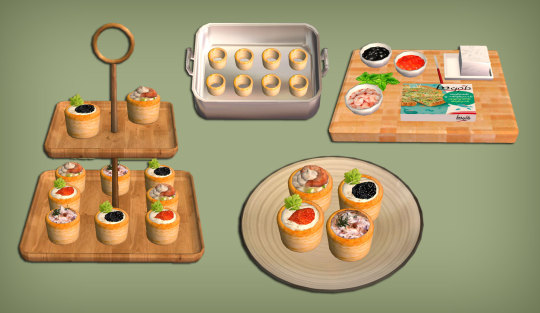
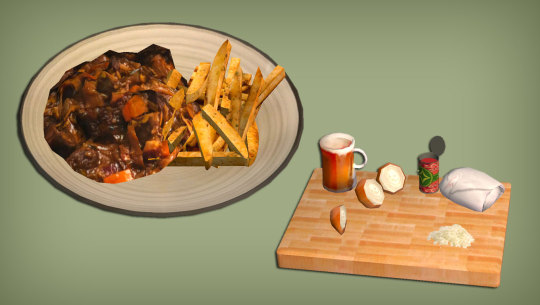
#sims 2 cc#the sims 2#sims 2 download#ts2#the sims 2 cc#ts2 download#food#sims 2 food#vol au vent#carbonade flamande#lunch time#dinner time#puff pastry#french fries
175 notes
·
View notes
Text
Vol au Vents aux Escargots (Snail Vol au Vents)

We rang in the New Year with a Broadway show --the brilliant, enthusing, mood-cheering 42nd Street!-- an on-the-road display of fireworks from six different cities and towns, and a supper of delicious hors-d’oeuvres and cocktails watching an excellent doco on Charlie Chaplin and another one on stunning gardens! My sister has been living in Burgundy for about a year and a half now, so when we visit her, we shop excellent wine and gorge ourselves with delicious regional dish like escargots. And thus, I found it our New Year’s Eve dinner a great occasion to make these scrumptious Vol au Vents aux Escargots, a special treat! Have a wonderful New Year, friends, one hopefully full of good food, good wine, and good people to share it with at your table!
Ingredients (makes 6 vol au vents):
1 egg yolk
½ tablespoon milk
about 300 grams/10.5 ounces Rough Puff Pastry
1 ½ tablespoon unsalted butter
a dozen and a half large Escargots de Bourgogne (Burgundy snails, prepared with parsley and garlic butter)
3/4 cup cream cheese
a pinch of salt
a pinch of salt and freshly cracked black pepper
4 fluffy sprig fresh Parsley
In a small bowl, whisk egg yolk and milk until well-blended. Set aside.
Preheat oven to 180°C/355°F. Line a baking tray with baking paper.
Roll out Rough Puff Pastry onto a lightly floured surface to about 1cm/0.5” of thickness. Using a 9cm/3.5” round cutter, cut out 12 discs of the Pastry. Brush the edges of 6 of the discs with egg wash, and place another disc on top of each, pressing very gently to seal. Using a smaller cookie cutter, lightly press in the centre of each double Pastry circle, to define a centre. Place the 6 Pastry circles onto prepared baking tray, and brush the tops with egg wash. Place in the middle of the hot oven, and bake, at 180°C/355°F, 20 to 25 minutes, until beautifully golden and puffed, and the bottom is a nice golden brown colour.
Remove from the oven and let cool slightly.
With a sea shell fork, remove snails (and the parsley and garlic butter) from their shells and into a small frying pan. Set aside.
In a medium bowl, combine cream cheese, and half of the snails’ parsley and garlic butter. Season, with a pinch of salt and black pepper. Finely chop Garden Parsley, and add to the bowl. Stir energetically until well-blended. Set aside.
Place frying pan on the stove, over a high flame, and cook, a few minutes until garlic and parsley butter is melted, and snails just sautéed in it. Keep warm.
Using a sharp knife, cut out and remove the centre of each vol au vent, and generously fill them with Parsley cream cheese mixture, and three warm sautéed snails each.
Serve Vol au Vents aux Escargots immediately.
#Recipe#Food#Vol au Vents aux Escargots#Vol au Vents aux Escargot recipe#Snail Vol au Vents#Snail Vol au Vent recipe#Vol Au Vents#Vol Au Vent recipe#Vol Au Vent#Puff Pastry#Rough Puff Pastry#Homemade Puff Pastry#Escargots de Bourgogne#Burgundy Snails#Snails#Snail#Burgundy Snail#Cream Cheese#Salt#Black Pepper#Black Peppercorns#Parsley#Fresh Parsley#Garden Parsley#Parsley and Garlic Butter#Appetizer#Appetizer recipe#Appetizer and Entrée#Holiday Kitchen#Festive recipe
2 notes
·
View notes
Text
Vol au Vent por Juan Manuel Herrera
Aprende a preparar esta receta de Vol au Vent por Juan Manuel Herrera
AMASIJO
Agua 400 Gramos
Harina 800 Gramos
Sal 20 Gramos
EMPASTE
Harina 400 Gramos
Manteca 1 Kilo
PASO A PASO
AMASIJO
Hacer una corona con harina, sal y verter agua en el centro.
Tomar la masa sin trabajar demasiado hasta formar un bollo.
Envolver en film y dejar descansar por 60 minutos.
EMPASTE
Trabajar manteca a…
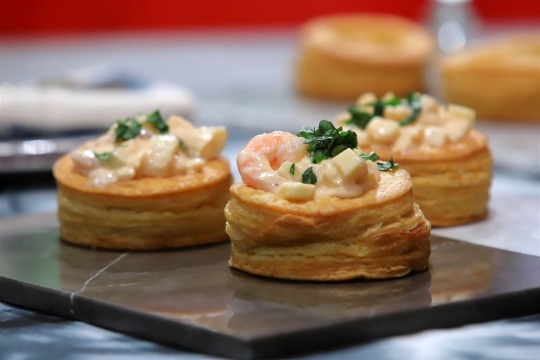
View On WordPress
1 note
·
View note
Photo
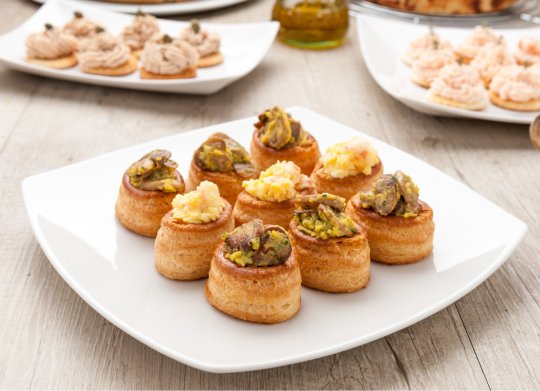
✿ ヴォロヴァン | Vol-au-vent
・フランスの伝統的な軽食。パイ生地の器にソースを絡めた具材を詰めて焼いた料理で、その名称は生地が非常に軽いため“風に舞う”を意味します。19世紀、フランスの偉大な料理人 “アントナン・カレーム”によって考案されたといわれています。
#ヴォロヴァン#vol-au-vent#vol au vent#フランス:パイ生地#フランス:2020〜#2020〜#フランス#food:フランス#food:フランス:2020〜#フランス:軽食#ペイストリー#pastry#フランス:ペイストリー#風に舞う#アントナン・カレーム
1 note
·
View note
Text
Vol-Au-Vent met Pulled Chicken en gehaktballetjes
Vol-Au-Vent met Pulled Chicken en gehaktballetjes

View On WordPress
#BBQ#belgian#belgische#blog#classic#dutch oven#gehaktballetjes#gerookte#grill#grootmoeders#klassieker#Koninginnehapje#Pasteitje#pellet#pulled chicken#recept#traditioneel#traeger#Vol au vent
1 note
·
View note
Text
Vol-au-vent
Gouache on paper / 13 x 18 cm / Briat 2022
Le journal du peintre
Les tableaux du peintre
Painting news project
Twitter
–
–
–
–
—
–
–
–
–
–
–
–
Le journal du peintre
Les tableaux du peintre
Painting news project
Twitter
–
–
–
–
–
–
–
–
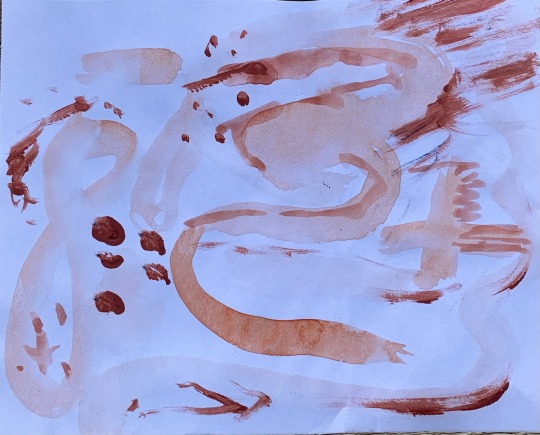
View On WordPress
0 notes
Text
The Jane Austen Ball and why it was never about Nina and Maggie
Otherwise known as (*takes a deep breath*): A completely inflated close-up look at various dialogues and events of Season 2 that prove that the Whickber Street Traders and Shopkeeper's Association Meeting Cotillion Ball was supposed to be Aziraphale's confession to Crowley
Look, the point's been made before but that's never kept me from making it myself again, still. In fact, even I made it before, at the end of one of my other metas. But I feel like it's absolutely worthy enough to get its own soppy, way-too-long post. And I do love it so very much to write ridiculously long essays on something that could easily be condensed into a short paragraph.
So, here we go! Snuggle up, get cozy, settle in and, most importantly:

(Word count: 3.177 | Reading time: ~13 minutes)
As I already said above, I laid out a similar case in my meta about why Aziraphale is somewhat of an unreliable narrator. I'll try and recycle it here briefly, so I can further make my point.
When Aziraphale arrives back in London from his Edinburgh journey, he seems oddly happy and giddy for the fact that he just had a rather odd and threatening encounter with Shax. I explain in my other meta that this is because he just spent the last hours of his drive reminiscing on the thrilling and romantic magic show adventure of 1941 and also the fact that he just found out that Crowley has been replaced by Shax and no longer works for Hell.
Ergo: We have a hopelessly lovesick Principality at our hands, who's practically swooning over his serpent who saved him, his books and his magic show all those years ago.
Ergo:
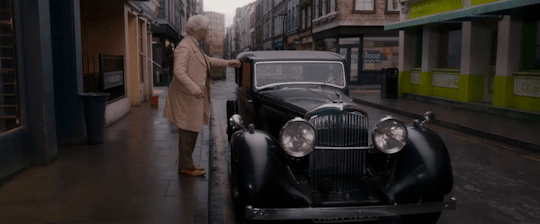
✨This✨
Realistically, Aziraphale should probably be a tad worried about the eery encounter with Shax, in which she definitely had the upper hand on him. But well, if you spend many-a hours driving across the serene countryside (Edinburgh is about an 8-hour drive from London), pondering on one of the craziest, sticky-sweet romantic adventures of your not-life life, well ... things tend to turn a little rosy around the edges. Head in the clouds and all that. Light shades of grey!
Alright, onwards: Once the angel, filled to the very brim with fond memories and butterflies, gets out of the Bentley, he's kindly met with a face full of verdant plants and a very in-character-grumpy Crowley.
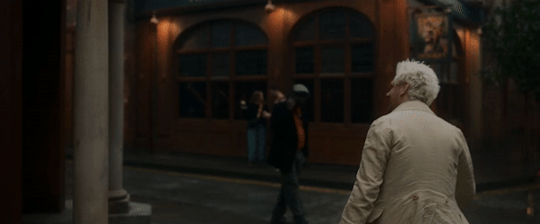
Fhwack! Way to burst the rosy bubble.
Seriously, the absolute lightning speed with which Crowley storms out to vacate the bookshop the very second Aziraphale arrives makes me giggle every time.
Let's make a first small (who am I kidding) diversion into analysing the following conversation in unnecessary detail ...
... simply because I enjoy quoting dialogue as an accurate reference in my metas. I'll also highlight certain passages I want to comment on in individual colours so I can back up my thoughts with them below. Alright, their little chinwag goes as follows:
Crowley: "They you are! I was worried something might have happened to you."
Aziraphale: "No, nothing happened to me. Very uneventful journey indeed. No strange things at all."
Crowley: "Good. That's what we wanna hear."
Aziraphale: "Um .. everything okay with- ah.." *nods to the bookshop*
Crowley: "Oh, yeah, fine. He's singing to himself. I think he must have been asleep. I heard snoring coming from his bedroom–"
Crowley, to the Bentley: "Did you miss me? I bet you did."
Aziraphale: "... I'm sure it did."
Crowley: "So, any more clues from the mystery of the missing archangel?"
Aziraphale: "Not exactly. Or, if there are, I haven't yet cracked the case. But I'm certainly hot on the trail of something."
Crowley: "I'm sure you are. Oh, by the way, the whole sudden rain and awning thing was a complete washout."
Aziraphale: "Sorry?"
Crowley: "You know, project making Nina fall in love with Maggie. I failed, it's your go."
Aziraphale: "I see. Well then, Whickber Street Traders and Shopkeeper's Association Monthly Meeting, here we come!"
Crowley: "You're really hosting the meeting?"
Aziraphale: "Absolutely! And I can guarantee you, it will be a night to remember."
At first glance, this has little to do with the plot of this meta but actually, it folds into my point very nicely! However, it's not time for that yet, so we'll just state the facts as they are for now and then bring them back 'round later when we need them. That being said: For the love of Someone, will these two ever manage to simply tell each other the truth of what happened instead of thinking they can protect each other by lying about it all the time? Hrmpf. As a big fan of open communication myself, I'm close to developing a stomach ulcer with the amount of false truths being spewed here. (Then again – and yes, that is another, way larger meta I'm currently cooking up – it plays so very perfectly into the whole Jane-Austen-Pride-and-Prejudice tragic miscommunication theme that this entire Season has, so I understand the point of it.)
Very uneventful journey indeed, Aziraphale, except for the fact that you were ambushed by a demon who told you she was Crowley's successor, knows about the rumors of the two of you being an item as well as what went down in 1941 (that almost had both of you exposed) and also seems to have figured out where you and your demon boyfriend are hiding Gabriel, all in the span of about a minute. No strange things at all, nooo!
And Crowley's "Oh yeah, fine" is a total lie too. Again, we see him make an absolute run for it before Aziraphale can even enter the bookshop. After all, he just once again witnessed Jim have a Gabriel-flashback, speaking of the Second Coming, while Crowley was alone with him. As fumingly angry he is with the amnesiac archangel – he's also absolutely terrified of what might happen (to him and Aziraphale) should Jim regain his memories. So, no wonder he's quick to vacate the premises after witnessing Jim's rather eery memory flashback (and was, just like Aziraphale, threatened by Shax mere moments later, lol).
But no, nothing out of the ordinary happened to either of them. Tip-top. Absolutely tickety-fucking-boo.
Alright, let's get back on track with the actual topic of this meta. Certainly hot on the trail of something, hm? At first glance, it might seem like Aziraphale is talking about the fact that Gabriel was in company of someone whenever he went to the Resurrectionist Pub. (The clue!) However, I don't actually think he is talking about that. Why? Because, and this slipped my mind too at first, he never actually follows any of this information up, does he? Yes, sure, he went to Edinburgh, found the capital-c Clue and then returned to London. But what does he do with it? Nothing. He doesn't keep investigating this hot trail because that's not the important thing he realized during his journey. No, the more important clue Aziraphale found during his trip, is that Crowley no longer works for Hell and that he is also very much irrevocably in love with him and must confess this at the earliest given chance. (The latter part isn't necessarily a new discovery for Aziraphale, but it surely is fuelled by the fact that he just realized Crowley's out of a Hellish job and simply hasn't told him yet.)
This exchange just the perfect indicator for the fact that Aziraphale, at no point during his drive back, was thinking about the Maggie and Nina mission. He has no idea what Crowley is talking about once he mentions it and seems surprised, even, that he would. Even though they just talked about it on the phone when Aziraphale was still at the graveyard. Which is another important piece of evidence because it means that the last status update Aziraphale got of Mission Lovebirds, was that Crowley had sensed an opportunity to make them fall in love – and had then hung up on him. Why is this important? Because it means that until that very point of their conversation, Aziraphale did not know that Crowley's attempt had failed! There would have been just as much of a chance of Crowley's weather miracle actually working out and Maggie and Nina already having skipped into the sunset happily ever after.
So, riddle me this:
Why would Aziraphale spend the entire ride back from Edinburgh plotting "a night to remember" (because clearly, he already had the entire Ball planned out down to a T in his head since he goes into action right away after arriving) if he didn't even know yet that Crowley's attempt had failed?
To be very clear here: We're not talking about Aziraphale driving on the M1 to London, having a silly little idea for putting on some good music, miracle-ing Nina and Maggie to dance to it and watch them confess their love–
No.
He planned an entire actual Cotillion Ball with very particular location design that involves re-arranging the entire bookshop, specifically designed individual outfits for (almost) every single attendee, topped off with a live band, hors-d'œuvre, drinks and an actual choreographed group dance.
During one car ride.

Where's the party planner Aziraphale AU? I'm waiting!
Now, sure, we know that it's still quite important for Aziraphale to convince Heaven of the faux-reason they gave for their accidental ✨25-Lazarii miracle✨. But if we're all honest, this all seems to be a tad much just to make two random humans fall in love, even for that.
Glittery ball gowns and suits? Red and gold wall curtains? A modified language filter? Bloody vol-au-vents?
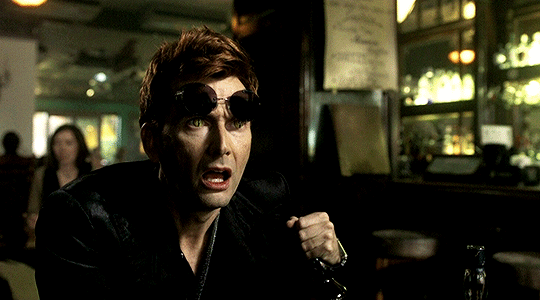
Talk about over the top ...
Once we start S2E5, Crowley is still surprised at the mere fact that Aziraphale is actually planning to organize the Monthly Meeting – and he doesn't even know yet that it's gonna be the most extravagant ball-boogaloo that the Whickber Street Community has ever seen! Aziraphale wanting to organize the meeting alone, is enough to render Crowley incredulous, because Aziraphale never mingles with the other shopkeepers. He usually actively avoids them and any sort of social encounters as much as he can because he doesn't care about the bloody Christmas lights, alright?
These things seem mundane and uninteresting to him, obviously, since all he really cares about is hoarding his book collection in peace like the little hedonist he is and drawing as little attention as possible to his none-business business.
Oh, right, speaking of books:
Let's take another unnecessarily detailed look at the whole Whickber Street invitation scene:
Aziraphale realizes very quickly that he's not the only one who's quite unenthusiastic about the blessed Chritsmas lights. And despite his very persuasive methods of temptation ...
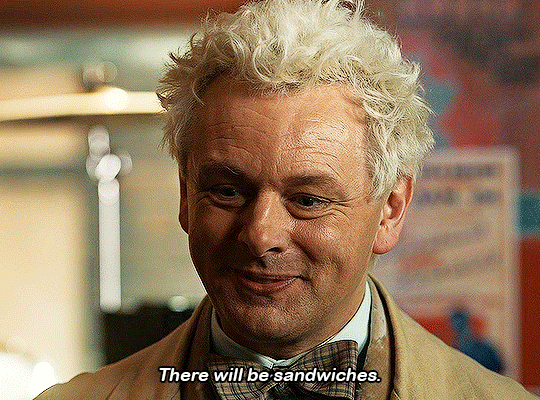
... he has to take some more drastic measurements. And those are?
That's right: Giving away his books.
I'll repeat it again, slowly: Aziraphale is willingly (!) giving away or lending his books to pretty much complete strangers to, allegedly, make two other humans strangers fall in love.
Seriously, who is that angel and what has he done with our prim, fussy, hedonistic Aziraphale that protects his books with the vice grip of an eagle carrying his precious prey?
Believe in the importance of Mission Lovebirds as much as you will, but we're talking about Mr. A.Z. Fell here who, over the past millennia, has pretty much spent every day actively working out methods to stop people from purchasing as much as a single paperback from his holy shelves.
And yet: the 1965 September Dr. Who Annual? Given away. The first edition of Expert at the Card Table that was S. W. Erdnase's personal copy? Lent away to grubby human hands to fondle around with.
Let's do another coloured dialogue diversion (don't worry, it's not as extensive as the last one):
Crowley: "You just did what I think you did?"
Aziraphale: "I'm not prepared to talk about it."
Crowley: "You gave away a book."
Aziraphale: "I had to! Maggie and Nina are depending on me. They just don't know it yet."
Crowley backs up my point: This is a huge deal. Aziraphale does not sell his books – let alone give them away for free. We're all shocked! Flabbergasted!
And the explanation Crowley and us get just ... doesn't satisfy. Something and someone sure is depending on this Ball and doesn't know it yet. But it's most definitely not Maggie and Nina, folks.
You know for whom Aziraphale would give away his books in the blink of an eye, though?
Mhm, that's right.

This pretty old serpent.
I want to take a minute to show you the reaction again that Aziraphale has upon entering the very same magic shop him and Crowley went to in 1941 to acquire the Bullet Catch:
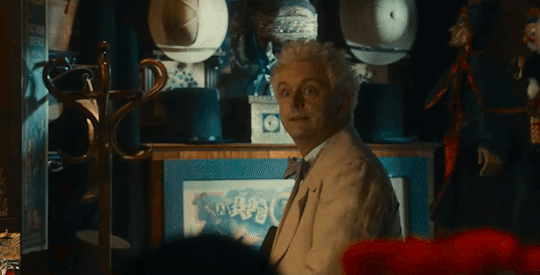
You ... you need a minute there, angel? You're sure looking a little ... affected.
And I mean, well, no wonder. He reminisced about that very memory four hours last night. To him, this shop is where the most turbulent, ecstatic, adrenaline-fuelled and romantic night of his life began. And it shows.
I've made my point in my other meta series about how Aziraphale is an incredibly nostalgic character. He romanticizes so many things in his memories – especially the parts that feature Crowley. So, it doesn't surprise me in the slightest that he's once again willing to loosen the tight grip he has on his book collection to get the successor of Will Goldstone's Magic Shop, the shop that started it all for him, to come to his fancy Ball.
As we watch Aziraphale and his little lap dog demon pat around Soho, I'd like to take another second to point out that he goes to seven or more establishments before he even invites Nina.
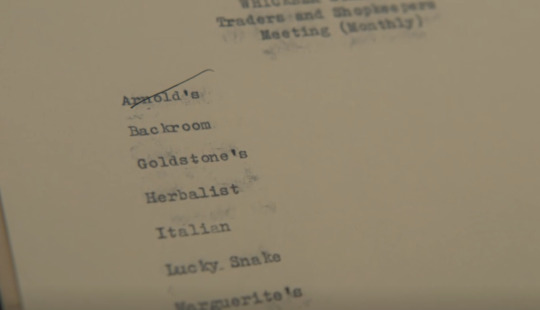
... and he only does so because she starts talking to them on the street. Almost like he'd forgotten about it. Why not ask her at the very beginning? To establish whether or not he'd have to book-blackmail her too?
"Perfectly ordinary invitation with no hidden agenda of any kind", except that he's using you and Maggie as a pretence to resolve his own clusterfuck of a relationship-miscommunication Jane-Austen-style so that he can then hopefully confess his undying love to his demon not-boyfriend boyfriend.
Marvellous!
You'll forgive me another short diversion but my God, the whole exchange at the Marguerite's restaurant with Crowley literally cat-call-whistling Aziraphale over to him (and Aziraphale checking if he meant someone else first, I–)? I am weak. So, so weak and
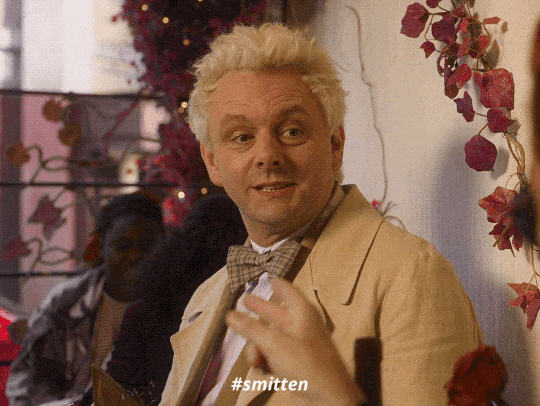
However, this is also when we get a snippet of Crowley finally revealing the truth in place of his "Oh, he's fine"-lie earlier and telling Aziraphale that he's actually pretty scared Jim might turn back into Gabriel and smite him altogether. And Aziraphale's response is, in a cosmic sense, (remember the pink paragraph now) so hilarious:
"Have you thought of just talking to him?"
Yeah, have you? Have any of the two of you? Just thought about talking? To each other? About anything?
'pparently not. But hey, it's all good because remember what the ultimate remedy for star-crossed lovers simply misunderstanding each other is?
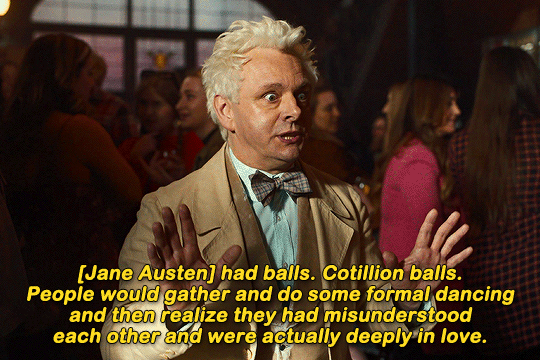
Bish, bash, bosh, problem solved!
Back at the ballroom bookshop, Aziraphale sends Crowley to invite Maggie in order to, in my opinion, not spoil the Ball-y surprise for him. (Inviting Maggie only now?! Wouldn't she be one of the only two guests who really should attend? Why the short notice? If she's really that important for the Ball you're planning, hm?)
On top of this, we see Nina almost not attending the Ball meeting after her partner broke up with her and Crowley being the one who coincidentally runs into her and ushers her into the bookshop before Shax and her "legion" of demons start creeping up on them. Again, if this hadn't happened by pure coincidence, Nina would have left to go home and this whole Ball would have taken place without her, rendering the apparent sole purpose of making her fall in love with Maggie useless.
Why doesn't Aziraphale care more for both of them to attend and be there? Why is he instead busy fussing over everything looking perfect and wonderful and doesn't even seem to notice that both Nina and Maggie are really late to the meeting?
Well. Well.
The answer's in the title, babes.
Alas, Crowley safely gets Maggie and Nina to join them, Mr. Brown is the only one who doesn't get a miracled outfit (fussy, petty angel, you just don't like him, do you?), Jimbriel stuns with glamour and flirt (and whatever sexually suggestive thing he does with his cheeks) and the Whickber Street Ball is a-go!

Sorry, I just had to chuck this in again because Crowley's face here absolutely kills me every time. He looks so confused, I am hollering.
And the heart eyes Aziraphale is making at Nina and Maggie now that they're actually here?
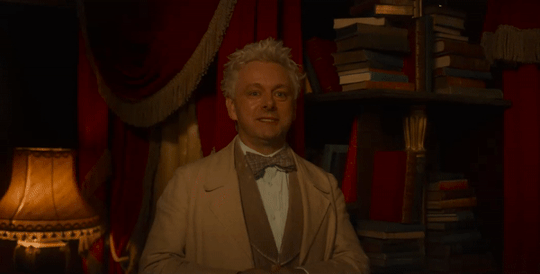
Oh, bless it, angel.
He's all like "Oh look, it's working! Jane was right! It's all going to be resolved, all the misunderstanding and quarrels! Crowley, where's Crowley–"
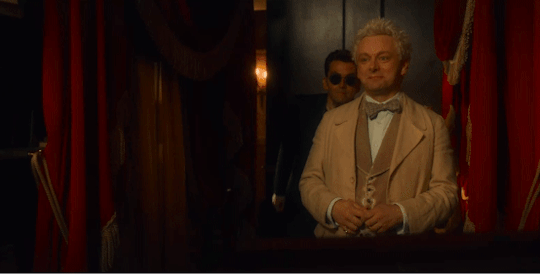
Ah yes, there he is.
Ladies and gentlemen, this is an angel who is not listening to a single word being said right now. No, in his head, Aziraphale is already down on one knee, pouring his heart out to Crowley after they just danced the night away.
Oh, yes, right. The dancing.
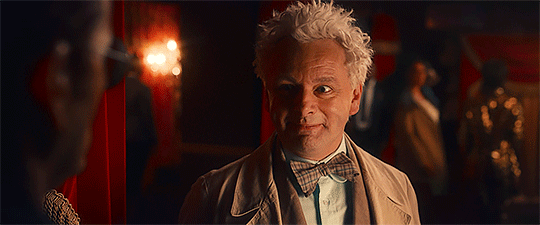
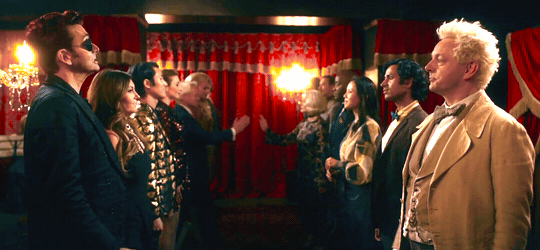

Parallel much?
But well, as marvellous and beautifully romantic as her stories tend to be, it turns out that Jane Austen isn't always right after all. Because before we know it, the perfect night shatters into many-a tiny pieces (literally).
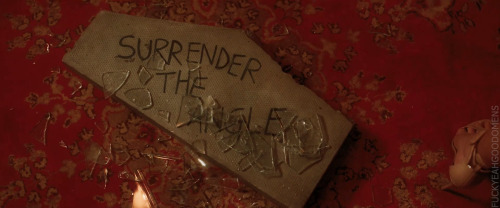
And once again, fhwack:

... the rosy bubble bursts.
Let's take one more deep breath so I can make my final point:
In S2E2, Aziraphale explains to us very exactly what Jane's Balls (hrhr) used to be about: Solving miscommunication and confessing love to one another.
During his car journey back from Edinburgh, Aziraphale:
doesn't know Crowley's Mission Lovebirds had failed
remembers 1941 and just how badly he's in love with Crowley
and also realizes that they seem to have been wildly miscommunicating for quite some time now. (Crowley didn't even tell him he basically got let go!)
So, what does maddeningly strong love plus a want to resolve all the miscommunication equal? That's right: A night to remember! A Ball to change it all! A dance, a vol-au-vent, a confession. And, ideally, a happy ever after. Because:
“It is a truth universally acknowledged, that a single man angel in possession of a good fortune Jane Austen collection, must be in want of a wife demon husband.”
The Ball was never for Nina and Maggie. As a byproduct, maybe, yes. But the whole rest of the glimmer and glamour, the careful, romantic planning and set up of it all, the book-bating the other shopkeepers– that was for Crowley and Crowley only.
And oh, if only it were as easy as in the books.

*whispers* I'm sorry, I had to.
***
Your honour, the tinfoil-hat crackpot defence rests. Feel free to share thoughts (and prayers) if you want to!
Au revoir! 💗
#good omens season 2#good omens#gos2#go2#good omens 2#good omens meta#good omens s2#crowley#aziraphale#ineffable husbands#my own meta#the bloody vol-au-vents made me do it#aziraphale has balls#truly#jaune austen ball#it is a truth universally acknowledged that this show is going to drive me out of my mind#azi just wanted his silly little love confession#but then he had to surrender the angle#bummer
564 notes
·
View notes
Note

I hope you like these treats poppy *big sparkle eyes holding them up to you* you deserve treats too!
Mmmmmmmm - scrumptious. Thank you very much.
#this angel has a sweet tooth#for little tarts#eccles cakes#crêpes and vol-au-vents#dips his finger into the buttercream and covertly licks it off
6 notes
·
View notes
Note
I was browsing a pop history book and it claimed that Humphrey was in love with Jacqueline of Hainault. Is there any evidence at all for that? Was Humphrey's marriage to her just about politics?
So... this got long. And it took a long time to write because everytime I tried to read through it, I ended up adding more. But I'm leaving it alone now. I'm sorry, I just have a lot of feelings about Jacqueline.
The summary version is: I don't think we should see their marriage as primarily a love match. I don't think we should see it is being primarily motivated by Humphrey's greed and ambition either. There isn't any really surviving evidence for how they saw each other - the marriage might have been just politics, it might have been companionable, it might have been loving (though I'd push for a wider definition of "loving" than just "romantic love").
It really annoys me the way that historians all tend to view Jacqueline as, first and foremost, a tragic romantic heroine who is let down by her useless and philandering husbands (John, Duke of Brabant and Humphrey), rather than, you know, a medieval noblewoman whose inheritance rights were attacked and undermined by her male relatives and who was, ultimately, a victim of the patriarchal power structure that meant her right to inherit her father's lands and titles was constantly under threat.
A brief history of Jacqueline before Humphrey: she was the only child of William of Bavaria and Margaret of Burgundy, Duke and Duchess of Bavaria, Count and Countess of Holland, Zeeland and Hainault. Her father made efforts to have Jacqueline's status as his heir safeguarded during his lifetime, including marrying her to Jean, Duke of Touraine, Charles VI of France's son, which would mean French support for her succession. Unluckily, Touraine died in April 1417, possibly by poison, and William died the month later. William's younger brother, John the Pitiless, left his ecclesiastical career to claim he, not Jacqueline, was the rightful heir of Holland, Zeeland and Hainault. In effort to forestall her uncle's effort and possibly to garner Burgundian support (the marriage is generally accepted to have been made on the advice of her mother and her brother, John the Fearless, Duke of Burgundy), Jacqueline married John, Duke of Brabant. Unfortunately, Brabant turned out to be worse than useless.
Brabant was unpopular within his own lands, was seen as weak and as ruled by his favourites. The marriage required papal dispensation, which was granted and then revoked and then granted again. Brabant pawned Jacqueline's lands to John the Pitiless without Jacqueline's consent. Brabant also inferred with her household, dismissing her attendants despite her protests. Yet historians, even reputable ones, often characterise the failure of their marriage in personal terms. It was, they say, a case of a "domestic or sexual" incompatibility. It seems she left him because of a bit more than an "domestic or sexual" issue, doesn't it?
Historians also discuss her marriage to Humphrey in domestic terms. It was a love match or a seduction of one by the other, and it broke down because Humphrey left her for another woman. There's also a trend to read the Hainault campaign purely in terms of Humphrey having a policy of self-aggrandisement and getting into a pissing competition with Burgundy... which also tends to erase Jacqueline from the struggle for her own lands and reduce her down to a Bad Idea for England. And, yes, the marriage was bad for the English but unless you want to contort yourself into knots, Jacqueline was the wronged party. It was her rights that were being attacked and undermined and her rights that Humphrey was asserting. It's perhaps not the most progressive, feminist or moral position to assume that because it was Bad For England, it was an immoral action on Humphrey's side. We end up with a situation where even progressive historians seem to think she had no role in the Hainault campaign, which was just a pissing competition between Humphrey and Burgundy, and, more importantly, her rights should've been thrown in the toilet because it was Bad For England.
Another side effect is making Burgundy look like an innocent victim who deserves praise for calling Humphrey out on his bullshit when it's really more of a case of the kettle calling the pot black except it turns out that the kettle ended up bullying, blackmailing and waging war against three of his female relatives (Elisabeth of Görlitz, Margaret of Burgundy (his aunt), and Jacqueline) to force them to sign over their lands to him. If Humphrey had delusions of self-aggrandisement and was a dick, Burgundy was just a more successful self-aggrandising dick who built an empire out fucking over his vulnerable female cousins and aunt. Jacqueline, not England, not the English conquest of France, not Bedford, not Humphrey, not the Beauforts, not Brabant and certainly not Burgundy, is the victim in this story.
After Brabant pawned her lands to her uncle, Jacqueline repudiated him and fled to England, after being granted refuge by Henry V. She arrived around February 1421, was granted a monthly income of £100 and was given the honour of becoming Henry VI's godmother when he's born in December that year. So from the start of Jacqueline's time in England, she was being treated as an important political figure. In Jacqueline's ODNB entry, Martyn Atkins says that Henry V "evidently saw her as a thoroughly useful ally".
It's unlikely that Henry V did this all out of the goodness of his own heart. It's not the sort of thing he's known for. Given that he had previously offered his two youngest brothers as prospective husbands to Jacqueline when Jean, Duke of Touraine had died and given that Jacqueline was seeking an annulment of her marriage to Brabant, I think that Henry was at least considering a marriage alliance between her and one of his brothers. It might even have been an unofficial or secret agreement between them - Henry would give her refuge if she married one of his brothers when the annulment came through. Wim Blockmans and Walter Prevenier suggest Henry saw an opportunity to establish "a new English influence" on the continent through marrying Humphrey to Jacqueline. David Rundle suggests that Henry saw giving refuge to Jacqueline as a way of putting pressure on Burgundy - however, Rundle doesn't seem to think the marriage to Humphrey was Henry's plan but rather Humphrey's continuation of Henry's policy. Regardless, having one of his brothers as Jacqueline's husband would bring Holland, Zeeland and Hainault under English influence, undercut Burgundy's power in the Low Countries and perhaps reduced England's dependence on Burgundy during the conquest of France.
And it's possible that had Henry lived, things would have turned out very different for Jacqueline. Henry would have been King of France by the end of 1422 (albeit as a contested title) and been able to more effectively pressure the pope to annul Jacqueline's marriage instead of several noblemen lobbying the pope for different outcomes. As king, Henry may have been able to control Burgundy better than John, Duke of Bedford did as regent. Henry would have also been an authority Humphrey would've listened to, so if the marriage became too risky or dangerous, Henry could have called Humphrey off. While in hindsight it looks like a bad decision, Jacqueline and Humphrey's marriage alliance may well have been successful in an alternate universe.
But why Humphrey? Why not John, Duke of Bedford who has the reputation of being the more sensible and steady brother? It might have already been decided that Bedford would marry one of Burgundy's sisters (he married Anne of Burgundy after the Treaty of Amiens in 1423 but it seems discussions were underway during Henry's lifetime) and thus was not "free" to marry Jacqueline. As the elder brother, he was the more prestigious groom and thus a better choice to show Burgundy Henry was taking their alliance seriously and would favour Burgundy over Jacqueline. Alternatively, Humphrey may have simply gotten along better with Jacqueline than Bedford did. They might have fallen in love.
But we don't know what went on. We don't even know when they married and while I think it's likely Henry V was seriously considering marrying Jacqueline to Humphrey, that's just supposition. Reasonable supposition maybe, but still supposition. If Henry didn't intend for them to marry, the decision came from them and there may have been pragmatic as well as political reasons at play as well as the personal.
Henry's death probably should have made them reassess their position. But I think it could have only cemented Jacqueline's. Her interest seems to have been in securing her inheritance, not being Mrs Humphrey of Lancaster or Duchess of Gloucester. Without Henry V in her corner, however conditional his support was, marriage to Humphrey was perhaps her last and greatest chance to assert her rights. It's also possible that Jacqueline felt herself vulnerable following Henry's death. She might have feared the English would consider imprisoning her or handing her over to Burgundy to secure his allegiance and sought to protect herself. For his part, Humphrey may well have chosen to marry Jacqueline and pursue her lands to fulfil his dead brother's policies - we know that he did present himself as a guardian and follower of Henry V's policies, long after it was wise, so it's not exactly a leap to see his marriage to Jacqueline motivated by the same reason. Henry V granted her refuge and honours for a reason, even if we don't know what that reason was.
We know little about the personal relationship between Jacqueline and Humphrey. Blockmans and Prevenier suggest Jacqueline saw Humphrey as "an attractive sexual and political alternative to the misery of her previous marriages, neither of which may have even be consummated" - but that is largely speculation. As I said, he might have been the best choice available for Jacqueline. The Holy Roman Emperor, Sigismund, supported John the Pitiless, Burgundy supported Brabant, and even if a papal dispensation could be got (considering she'd already married his brother), the Dauphin (later Charles VII of France) was busy contesting his own right to inherit. England was the closest power she could turn for assistance and Humphrey was the highest-ranked noble she could marry. He might have been a personally attractive groom as well but I think Jacqueline was more moved by his political strength.
Jean de Waurin says that Jacqueline and Humphrey "concluded together" to write a letter to Burgundy during the Hainault campaign and we can take that as evidence that Humphrey was working with her and had trust in her, but that's more political than personal. They did not have children, though there were rumours of a pregnancy at one time. Given that Jacqueline did not have children in any of her four marriages and Humphrey did not father legitimate children in his two marriages (at least that we know of; it's possible that miscarriages and stillbirths went unrecorded), it's impossible to tell whether their childlessness signifies anything more than fertility troubles for one or both of them.
Another piece of evidence is the copy of Jean Froissart's Poems (Paris: BnF, MS.fr. 831) that Humphrey owned around the same time as his marriage to Jacqueline. On the flyleaves are notes written in his own hand. Some refer, affectionately, to Jacqueline: "Cest bien saison a Jaque de Bavarie (it's a good time/season for Jacqueline)". But others read "plus laide nya Jaque de Bavarie (there is no one uglier than Jacqueline)". Obviously, we don't know the context in which Humphrey wrote these things - it might've been an inside joke - but just looking at it... it's not exactly Husband of the Year material.
There's also his adultery. David Rundle identified Jeanne de Warigny as a prospective lover based on the fact that in the same page as Humphrey declared no one was uglier than Jacqueline, he also wrote, "plus belle nya my waryny (there is no one more beautiful than [Jeanne de] Warigny)". And, of course, there's Eleanor.
Jacqueline's reaction to Humphrey's adultery is unknown. She may have viewed it pragmatically, she may have been upset by it, she may have not cared. Depending on her own views on sex, childbearing and Humphrey himself, she might have even been relieved. There is some argument that a man's adultery was normalised at their level of society, given that marriages at that level of society were political, not personal, and that, as cis men, their infidelities would not disrupt the line of succession through a false paternity event. Jacqueline had a fair few illegitimate half-siblings whom she was close to. On the other hand, chroniclers, when writing about a nobleman's adultery, nearly always asserted the victimhood and distress of his wife - though there are some arguments that these accounts were nearly always attached to a broader, more political critique and reflect more the chronicler's dislike than how his wife really felt.
Humphrey and Jacqueline's marriage is nearly always depicted ending in domestic terms. He grows disillusioned with Jacqueline, he takes up with her lady-in-waiting and then abandons her. Blockmans and Prevenier say that Jacqueline's "explosive personality ... appears to have alienated" Humphrey, in addition to the difficulties to the Hainault campaign. They also describe his departure as abrupt but I believe there's some argument by English historians that Humphrey always intended to return to England when he did.
Two accounts from the Low Countries, attributed to Dirck Pauw, depict Humphrey as retreating disconsolate and disappointed upon the realisation that their marriage was unlawful because her marriage to Brabant was valid, their marriage was thus unlawful and based on a deception and Jacqueline was thus an adulteress and bigamist. Pauw's earlier work, Chronicon Hollandie, is more sympathetic to Jacqueline, saying she was misled about her marriage to Brabant, while the Hystoria de comitatu is less sympathetic, presenting Jacqueline as being the misleader and framing her behaviour as a betrayal of Humphrey. In England, Polydore Vergil, while stating that Humphrey was moved by love for Jacqueline or greed for her lands and asserting that Jacqueline returned to John, Duke of Brabant when she didn't (at the time of the annulment, Brabant was dead and buried anyway), ultimately frames the dissolution of their marriage in the very image of domesticity, the nagging wife:
[after their marriage was annulled] Jacobina clung to her former husband [Brabant], not against Gloucester’s will, since he was governed by righteousness, and had already grown tired of the woman’s nagging.
Jean de Waurin also gives a domestic account of their parting, where Humphrey is accedes to a request that Jacqueline stay only after he garners promises and solemn oaths she'll be protected. Then, Waurin reports:
...the said duke of Gloucester departed from the duchess, his wife, and they took leave of one another, but you may well think and believe that it was not without pitiable and dolorous tears and groanings according to the manner customary with ladies, especially when they love well their husbands or friends.
But Waurin also includes a reference to Humphrey taking back Eleanor Cobham back to England with him. Waurin doesn't explicitly say Humphrey was having an affair with Eleanor and preferred her to Jacqueline but it's pretty well implied:
And the said duke of Gloucester took back to the land of England Eleanor Cobham, a very noble damsel and of grand lineage, whom he afterwards married as you will hear, and who had come with lady Jacqueline, the duchess, his wife, to the country of Hainault by way of diversion, as young damsels are desirous of seeing new countries and foreign regions for she was also marvellously fair and pleasing, and showed herself of good disposition in various places.
More pointedly, there's John of Amundesham's account of 1427-1428 parliament, where a group of London women came to parliament to give letters to Humphrey, the archbishops and the other lords present:
The tenor of these letters was to reproach the duke of Gloucester on account of his refusal to rescue his wife from her effective imprisonment by the duke of Burgundy. Rather, as his love for her had grown cold, he was inclined to leave her in captivity, and he was holding himself for another in adultery and quite publicly so, to the ruin of himself, of the realm and of the strength of the institution of marriage.
Here, Humphrey's abandonment of Jacqueline is depicted in very domestic terms. It is affront to all wives, it is an affront to all women and injures the very institution of marriage. It is the good wives of London who seek a corrective for his behaviour. Humphrey's apparent refusal to rescue his wife is credited to his emotional state, rather than the politics of offending a vital ally - he doesn't love Jacqueline anymore and openly lives in scandalous sin. It also bears noticing that English source didn't have the same doubts about the validity of Jacqueline's marriages that continental sources express.
Similar sentiments are found in an anonymous poem written not too long after this event. The "Complaint for My Lady of Gloucester and Holland" is presented as being written by a member of Humphrey's household and his voice as but one of many, both old and young, high and low, crying out for Jacqueline's return. The duke's household is disordered, led astray by a figure who is almost certainly meant to represent Eleanor Cobham, and Jacqueline's hoped-for return is depicted as the return of a good and efficient lady and wife who will set the household to rights, drive away the corrupting influences and uplift the just who have longed for her return:
þeyre truwe names shal beo knowe
Affterwardes with goddes grace
Whane blake mystes / ar leyde lowe
And clere trouth shall shewe his face
Wychches bawdes / away tenchace
fflaterieres and al raskayle
Ageynst trouth . þat may not vayle
[Their true names shall be known
Afterwards with God's grace
When black mists are laid low
And clear truth shall show his face
Witches, bawds are driven away
Flatterers and all rascals
Again truth, they may not hide
Nb. "bawds" most likely is used in the earlier sense of one who procures prostitutes for others (i.e. pimps) rather than referring to prostitutes/harlots themselves]
I want to talk about the Eleanor figure a little because it's striking how she is constructed as this inhuman, even monstrous, figure who is leading the good duke astray with her magical wiles. She is said to resemble a mermaid, enchantress and sorceress and is termed as a false Circe - she is, in other words, an unnatural figure associated with magic, pride and sexual looseness. She is also accompanied by "a gret route / Of wychches" and the description of their "courage serpentyne" further dehumanises them and renders them monstrous - Debbie Felton notes the tendency of Greek monsters, like Medusa, Scylla and the Hydra to have serpentine. These witches - also likened to sirens - employ all their power and might, incantations, song, medicines and potions:
To make him strange / and beo forsworne
Vn to þat goodely fayre pryncesse
[To make him [Humphrey] strange and be foresworn
Unto that goodly fair princess [Jacqueline]
It's striking, too, that unlike the London women's petitions, blame here is redirected away from Humphrey onto the Eleanor figure. She has used magic to make him unlike himself. But she will be banished, along with her witches, sirens and bawds, with Jacqueline's return.
Most historians know magic isn't real and have had the benefit of some feminism. So instead of blaming Eleanor's magical spells, the image that dominates is a marriage breaking down because Humphrey abandoned Jacqueline to hook up with her ambitious lady-in-waiting and her mysterious womanly wiles. It's rather odd seeing the way that people describe the differences between Eleanor and Jacqueline. Jacqueline was "dull" (there is no way to know that, what we know of her life suggests she was a fighter - and honestly, the impression I get is that Dutch historians have a very different view of Jacqueline (cf. Blockmans and Prevenier's "explosive personality" remark)). Eleanor was "a strong and ambitious woman, a striking contrast to the Duke's first wife". I just... what part of Jacqueline's life makes you think she was weak and unambitious?
Jacqueline did have some hand in creating this image of a good, loving wife victimised by her husband. She wrote letters to both Humphrey, Henry VI and to the English parliament, recounting her woes, asserting their duties to her and appealing for help. In one letter to Humphrey, she appealed "for help to your sorrowful creature, if you do not wish to lose me forever. I have hopes you will do this, for I am fully prepared to accept death for love of you, so much does your noble dominion please me". In others, she refers to herself as "the most sorrowful woman, the most lost", "the most betrayed [woman] alive" and as a "sorrowing woman, discomforted and left to bear the displeasures, annoyances, impoverishments and oppressions that I have for so long a time endured without help or comfort" . She accuses Humphrey of having "banished [her] wholly from [his thoughts]".
These letters depict Jacqueline's distress clearly. It's possible that she did love Humphrey and that his abandonment was an emotional and political blow. And in some ways, you can see why Polydore Vergil referred to her "nagging", why she has the image of a piteous, weeping woman who must be dull next to an accused witch. There's no doubt that Jacqueline was distressed by Humphrey's abandonment or that she was greatly wronged.
But it's also possible that the references to love weren't a genuine admission of romantic attachment but the employment of rhetoric. C. Marie Harker describes these letters as using "stock phrases of victimized womanhood", noting that Jacqueline presents herself as engaging in wifely supplication and that Jacqueline "well understood the strategic value of publicly-perceived feminine virtue". As Humphrey's wife, Jacqueline had ostensibly deeper claims to Humphrey's loyalty than a political ally. She was able to refer to the bonds of marriage and love between husband and wife to lay claim to these loyalties, to require his action. They may have been intended to guilt Humphrey and the parliament into action.
Because, in reality, the real reason for Jacqueline's abandonment was politics.
The Hainault campaign threatened to derail the Anglo-Burgundian alliance at a point when it was vital to English hopes in France. If Henry V had been willing to offend Burgundy or defend Jacqueline, Bedford wasn't. Possibly, he couldn't afford to. And, in the end, appeasing Burgundy and keeping him onside mattered more than Jacqueline to England and to Bedford.
Nor did Humphrey completely abandon Jacqueline either. According to Waurin, she was to return to England with Humphrey but didn't after a request from her mother and "nobles and corporations of the good towns of the said country of Hainault" to remain in Mons. Humphrey in one account was said to have left his treasure behind with her. Once back in England, he continued to send her military aid but this was undercut by resistance from Bedford and parliament. What assistance Humphrey did send wasn't enough and was further undermined by someone on the English side informing Burgundy of troop movements (according to Waurin, at least). Furthermore, Humphrey's return from Hainault to England saw him immediately embroiled in a feud with Henry Beaufort, Bishop of Winchester which may have resulted in Humphrey believing that he left England again, he would return to find his position further undermined.
In some ways, events simply overtook them. Some of Jacqueline's letters begging for Humphrey's assistance and return were captured before they could be sent. Humphrey's letter urging Jacqueline to flee arrived after she had been captured by Burgundy. She subsequently escaped and continued to resist Burgundy's forcible takeover of her lands. Her appeals seem to have been for aid against Burgundy, not aid in returning to England. Possibly, she felt that to return to England would mean surrendering her claims.
It's almost hilarious how close Ruth Putnam (in the only English book-length biography of Jacqueline, published in 1904) comes to getting it when she suggests "Winchester and Bedford used Eleanor [Cobham] as a tool to work an end demanded by the exigencies of English foreign policy" - i.e. Eleanor was a honeypot to keep Humphrey from helping Jacqueline. It's almost as if their marriage faced bigger problems than Eleanor!
By the time the pope announced his decision on Jacqueline and Humphrey's marriage in January 1428, it had been six years since Jacqueline had sent off for an annulment from Brabant. The pope's belated judgement was that her marriage to Brabant was legal, her marriage to Humphrey thus invalid (though, this was the time of the papal schism and one out of the three popes still thought it was valid - though not the one that the English followed). According to one account, the pope's ruling stated that though Brabant was dead (he died in April 1427), Jacqueline could not legally marry Humphrey again. There is no explicit evidence for how they reacted to the news.
Humphrey appears to have married Eleanor almost straight away; I suspect his main reaction was relief. Whatever he felt for Jacqueline, the marriage caused him severe political problems and his failure to properly aid Jacqueline damaged his reputation. It had also exposed Eleanor to criticism and made her into a scapegoat, which also exposed his inability to protect his concubine and maintain control of his household. It probably also made him an unappealing groom on the medieval marriage market should he have tried to find a bride of a similar social rank to himself, particularly if there were still doubts about the validity of his marriage to Jacqueline. As Jacqueline's marriage to Brabant showed, the pope could grant and then revoke permission and then grant it again.
For Jacqueline, the annulment marked the end of English support in her struggle and she appeared to accept the weakness of her position. On 3 July 1428, she signed the Treaty of Delft with Burgundy, maintaining nominally Countess of Holland, Zeeland and Hainault while Burgundy administered her lands. If she died childless, he would inherit - and he, of course, included a clause stating she needed his permission to marry.
There is a romantic legend that, in 1432, Jacqueline secretly married Frank van Borssele in contravention of this clause and when Burgundy found out, he imprisoned Borssele and forced Jacqueline to surrender her titles and lands in return for Borssele's freedom. Because she was in love, in true love at last, Jacqueline duly does so and she becomes a good wife for Borssele before dying tragically a mere two years later.
This has largely been debunked. Borssele's imprisonment is now believed to have occurred because Burgundy was jealous and suspicious of his power and influence. The Treaty of Delft did not satisfy Burgundy and he continued to undermine Jacqueline's position until she signed the Treaty of the Hague in 1433, surrendering her titles and lands to him in exchange for the income of several estates. Possibly, this also included his permission to marry and in 1434, she married Borssele. They did not have children and Jacqueline died two years, generally assumed from tuberculosis. Reportedly, she married him for love.
Sources:
Martyn Atkins, "Jacqueline [Jacqueline of Bavaria], suo jure countess of Hainault, suo jure countess of Holland, and suo jure countess of Zeeland (1401–1436), princess", Oxford Dictionary of National Biography (2004, updated 2006)
Wim Blockmans and Walter Prevenier, The Promised Lands: The Low Countries Under Burgundian Rule, 1369-1530, trans. Elizabeth Fackelamn, ed. Edward Peters, (University of Pennsylvania, 1999)
Marc Boone, "Jacqueline of Bavaria in 1425, a lonely princess in Ghent?", The Ricardian: Journal of the Richard III Society, vol. 13 (2003)
Margreet Brandsma, "Riches and power? Princely widows in the Burgundian period. The case of Margaret of Burgundy (1374-1441), The Medieval Low Countries 5 (2018)
Eleanor P. Hammond, "Lydgate and the Duchess of Gloucester", Anglia 27 (1904)
C. Marie Harker, “The Two Duchesses of Gloucester and the Rhetoric of the Feminine”, Historical Reflections / Réflexions Historiques, vol. 30, no. 1 (2004)
Renée Nip, "Conflicting roles: Jacqueline of Bavaria (d. 1436), countess and wife" in Saints, scholars and politicians : gender as a tool in medieval studies: festschrift in honour of Anneke Mulder-Bakker on the occasion of her sixty-fifth birthday, ed. Mathilde Van Dyk and Renée Nip (Brepols, 2005)
Ruth Putnam, A Mediaeval Princess (G.P. Putnam's Sons, 1994)
David Rundle, "Good Duke Humfrey: Bounder, Cad and Bibliophile", Bodleian Library Record, xxvii ([2015] for 2014)
Valerie Vancken, "United in revolt and discourse: urban and noble perceptions of 'bad government' in fifteenth century Brabant (1420-1)", Journal of Medieval History (2017)
Polydore Vergil, Anglica Historia (1555 version): A hypertext critical edition, ed. and trans. Dana F. Sutton (2005; last updated 2010)
Jean de Wavrin, A Collection of the Chronicles and Ancient Histories of Great Britain, Now Called England: Volume 3: From AD 1422 to AD 1431 ed. Edward L. C. P. Hardy (Cambridge University Press, 1891, digital version 2014)
#sorry i just have a lot of feelings about jacqueline#asks#vol au vending machine#text posts#jacqueline of hainault#humphrey duke of gloucester#eleanor cobham#henry v#this post has everything: a vent about jacqueline's current reputation#a sideline into my desire to write a paper about eleanor cobham as the monstrous feminine#a callout post for philip the good#philip the good my arse#reassessing humphrey's relationship with jacqueline...#of course it is also super long#anyway this is done so now the other asks i have in my inbox can be looked at
16 notes
·
View notes
Text
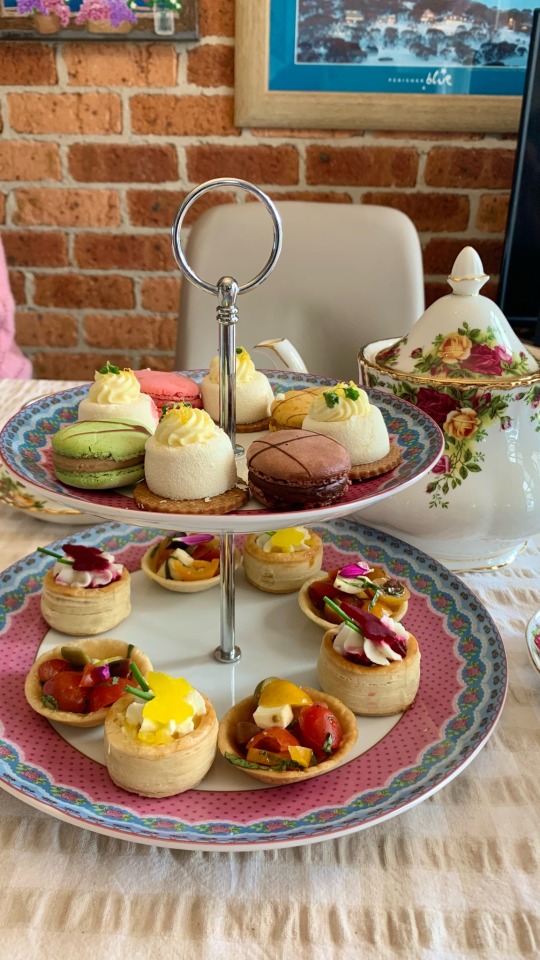
High tea at home ☕️🍰🏡
#high tea#sweet treats#teatime#tea pot#pretty food#macarons#cottagecore#afternoon tea#vol au vents#pastries#baking
64 notes
·
View notes
Text
The fact that bakers are tailoring their flavors according to the judges’ preferences in order to get their approval and that accursed Hollywood handshake is fundamentally wrong
This isn’t the baking world according to Paul and Prue. Their tastes shouldn’t bloody matter.
What happened to objective judging?
#gbbo#gbbo 2022#bake off#gbbo spoilers sort of#Sandro’s vol au vents sound amazing#but he shouldn’t need to cater to Paul’s favorite dessert in order to get a handshake
7 notes
·
View notes
Text

“ you must be mayven, yeah? come on in; mum had to go pick up some last minute gifts, but she should be back in an hour. “ she’s never been a fan of the holidays. but she has to admit, the blending of all the typical festivities into their own personalized set of events is something she has no choice but to admire since aisling adopted her. unless anyone in the family observes certain religious traditions, for the most part, they just contribute their own rituals and watch the festivities elevate from there. today is the first of these celebrations. the day of the jonas brothers. no kidding. that’s the genuine, honest to goodness title for today. it started as aisling trying to suggest jones-mas as a substitution, then jone-mas, and then richard misheard her and started calling it jonas, and then renée, in a haze of rosé and peppermint candy canes, declared the day of the jonas brothers to be off to a brilliant start. now, two years later, they have the great pleasure of explaining the entire saga to mayven. but tina’s wiser than her age should imply. let it fall to someone else to explain the logic behind today. for now, she holds out her hand, gesturing to her coat with raised brows. “ i can hang it in the closet, if you like? and there’s drinks and snacks in the dining room, but be careful; henri gets cranky when people eat snacks before dinner, and etienne is trying to get him to agree to a road trip to some culinary fair in texas, so he won’t stop him if he starts ranting. “

@manhattanopus liked THIS POST for a family holiday dinner starter! ( and all the locations for the rest of the muses are in the tags if u want mayven to move around and mingle! )
#manhattanopus#( closed starter. )#( MUSE: T. LI. )#( I HOPE THIS IS OKAY MY BELOVED )#( LMK IF U WANT IT CHANGED AT ALL )#( and now for the other muses!!! )#( stanley and victor are up on the roof tending to the greenhouse )#( richard is trying to take a nap in the living room but ramsay keeps nudging him to watch the simpsons )#( nate is sitting beneath the dining room table with a tray of mini vol au vents )#( eli is trying to find a solid playlist in his room so they don't have to listen to mari.ah car.ey all night )#( renée is determinedly ransacking the cd cupboard for anything with the jonas brothers on it )#( leo is trying to wrap his presents in the hallway )#( sammy and tim are locked in a fierce debate about why cookies can't be used as burger buns )#( sammy can't see what the problem is bc they have brioche burger buns and brioche is sweet???? )#( tim is thoroughly revolted by the very idea )#( henri and etienne are preparing dinner in the kitchen )#( and andrew is practicing mario kart for the post-dinner tournament )
4 notes
·
View notes
Text
RJM giving out Rocco La Bête cover of Whip My Hair was crazy
#I WHIP IT REAL HARD#rjmverse#teddy text#he’s so good#rob you know you’re good#stream DEFS or even better#BUY VOL-AU-VENTS ON BANDCAMP!
0 notes
Text
Vol-au-vent au saumon fumé
Une sauce crémeuse aux champignons et au saumon fumé sera parfaite pour accompagner les vols au vent.
Depuis la vache folle on ne mange plus de cervelle, d’ailleurs il me semble qu’il y en a plus en magasin. Les rognons, je n’en mange plus non plus, j’évite les abats.
Il reste peu de choix et les boîtes de sauce pour vol-au-vent, c’est pas terrible, le seul avantage c’est que c’est vite…
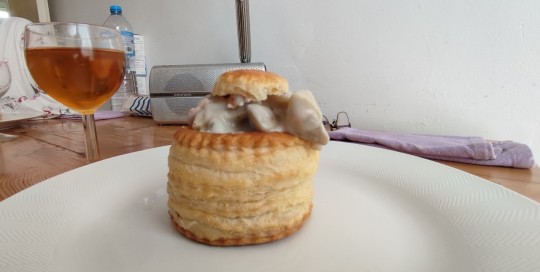
View On WordPress
0 notes
Photo
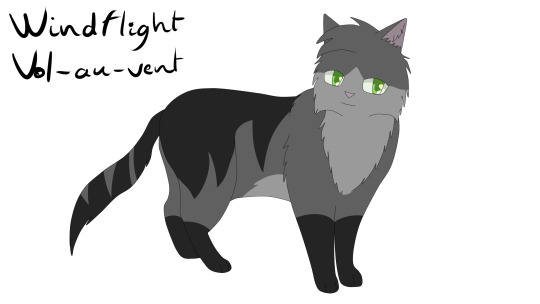
Vol-au-vent (Clan du Tonnerre)
Windflight (Thunderclan)
0 notes
